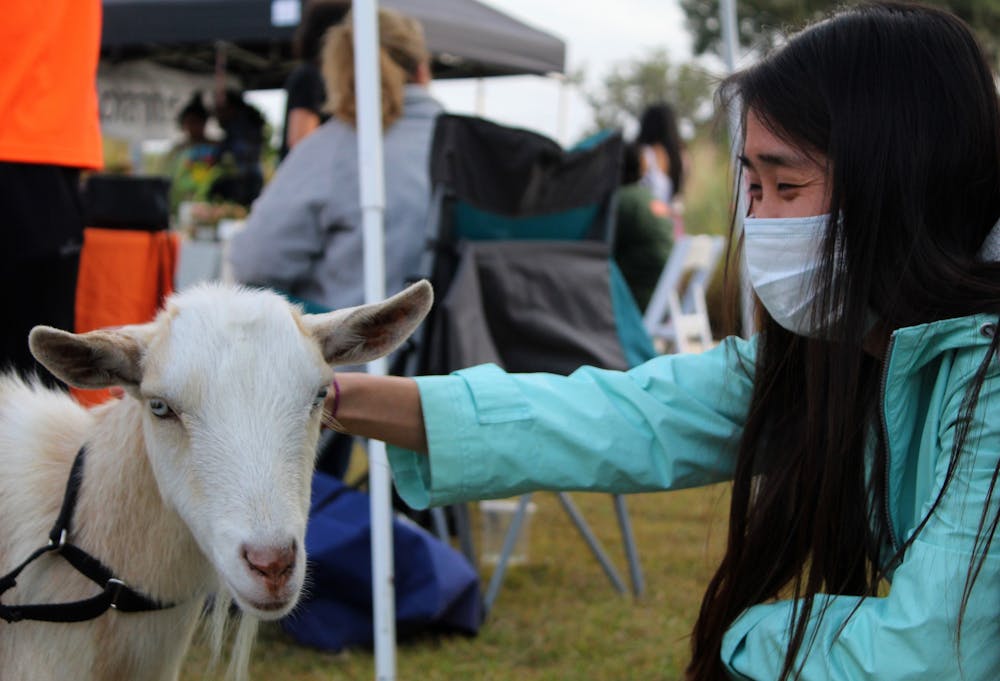The smells of wood smoke and freshly squeezed Hamlin oranges wafted through the festival air outside of the Cade Museum near Depot Park Saturday afternoon.
Meanwhile, a trio of string musicians played over the laughter of children trying out their lumberjack skills.
A team of children faced each other, gripping the handles of a two-man saw. Heaving back-and-forth in a seesaw motion, the metal teeth carve through the bark of a thin tree log. To the beat of folk music, the grinning duo triumphantly carries back the sliced log as a memento for their family.
Local farmers taught almost 2,000 members of their community about Florida agriculture at the Farm Bureau Food and Agriculture Festival and the Cade Museum for Creativity & Invention.
Hosted by The Alachua County Farm Bureau Young Farmers & Ranchers, 21 vendors sold products ranging from varieties of cheese to succulents. Food trucks supplied global cuisine spanning Cuba to Venezuela and back home with American hot dogs, barbecue and ice cream.
Kevin Korus, a Young Farmers & Ranchers board member, said he started the festival with a vision to promote education within Alachua County, bridging the disconnect between mindless grocery store trips and knowledge of where food comes from.
“To see their eyes light up,” Korus said. “We see people who don’t normally get out on the farm.”
Buying from local farms, Korus said, supports local economies, reduces shipping costs and protects the environment. It minimizes the ecological effects of shipping and makes sure food is fresh.
“You’re not shipping steaks across the U.S.,” Korus said. “You’re buying them local.”
The festival also creates an avenue for local farmers to expand their reach, he said. Having the Cade Museum open its doors for free is a big draw for the community.
Kevin Lussier and his family begin milking their 80 jersey cows before sunrise at 5 a.m.
Amid this daily discipline, Lussier, the owner of Hawthorne Creek Creamery, still made it out to the festival to show off the work of his small artisan dairy farm that produces cheese: gouda, Havarti, swiss and tomme.
After 60 days of aging, he said, the cheese makes its way to local restaurants and is soon to be on the shelves of Publix Super Markets and Winn-Dixie.
Lussier said when people drive by or pick up orders, they realize it’s a family operation.
“It’s a passion of ours,” Lussier said. “We’re with those animals every day. We’re making sure those animals are cared for.”
Lussier is also the chair of the Alachua County Farm Bureau Young Farmers & Ranchers and said this event is special to him. He’s happy to be back after the festival took a hiatus in 2020 due to the COVID-19 pandemic.
“They’re able to come here and get a view of what our world is,” Lussier said. “We’re trying to connect a nonagricultural audience with the agriculture that’s in their backyards.”
Especially during the pandemic, Lussier has seen a lot of consolidation in the agriculture industry and supply chain issues. The festival, he said, demonstrates how farmers across all industries have a passion for what they do and are working amid industry challenges.
“We’re proud to be able to feed this country,” he said. “It’s just nice to be able to make the cheese right there in Hawthorne.”
Other attendees were drawn to a single glass case. Inside, they saw crawling swarms of honeybees. The worker bees scrambled over each other, caring for their queen and hive.
Tatiana Sanchez, donning silver bee earrings, said she wants people to gain an appreciation for the pollinators, working as the commercial horticulture agent for Alachua County and UF-IFAS Extension.
People should protect all pollinators, she said, because they contribute to one-third of specialty crops, including fruits and vegetables.
“They are such an important part of agriculture,” Sanchez said. “Everybody needs to eat.”
Farther down the lines of tents stood a goat flocked by children. His mellow blue eyes and goatee are inviting, and the children hug his white fur and befriend him.
A farm goat at heart, Jack never left his home in Archer –– until Saturday. It’s his debut in the big city, and he’s taking in all the sights and sounds. The 2-year-old Nigerian dwarf goat is typically a breed for meat goats. But Jack is just a pet.
“You’re a very lucky goat,” passersby told him.
“Baaah,” the goat replied.
Jack belongs to Mary Lee Sale, who brought him onto her farm to teach her son about agriculture as he grows up.
“It makes them put something else before themselves,” Sale said.
She helps children aged 5 to18 work on projects ranging from areas like citizenship, communication and creative arts as part of the 4-H program. She teaches them leadership, empathy and other life skills within the UF-IFAS and county partnership.
Lee Sale said she was glad to see all the families with young children at the festival.
“The cool thing is kids want to do that, they don’t shy away from it,” she said.
While the 4-H program has grown, she said its roots remain in agriculture.
“Everything that you’re wearing comes from agriculture,” Sale said. “The roads that you drive on, the cars that you drive in — everything has roots in agriculture.”
As a festival organizer, Korus said he hopes it grows to include more vendors that represent all of the local commodities, ranging from dairy, beef and goat to watermelon, strawberries and squash.
“Whatever you grow locally, we want you represented here at the event,” Korus said.
The Young Farmers & Ranchers plan to host another festival in the fall of 2022.
Contact Alexandra Harris at aharris@alligator.org. Follow her on Twitter @harris_alex_m.

Alexandra is a senior journalism major reporting on Science/Environment for The Alligator. Her work has appeared in The Gainesville Sun, and she filed public records requests for the Why Don't We Know investigative podcast. She has a passion for the environment.






